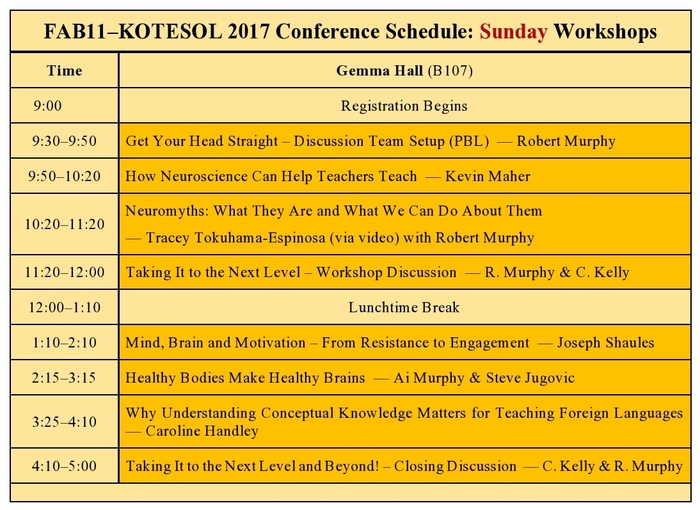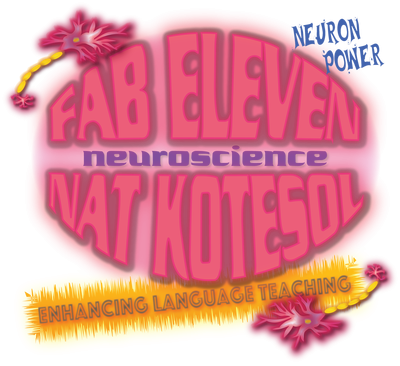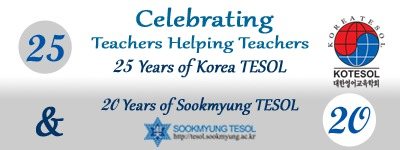Archive Copy.
Sunday FAB Workshop Schedule (Download PDF at bottom of page.)

Sessions by Time Slot: 9:30 9:50 10:20 11:20 1:10 2:15 3:25 4:10
Saturday Schedule: HERE
9:30-9:50 Robert Murphy
Getting Your Head Straight - Discussion Team Setup (PBL)
This is a vital session for ALL participants! FAB conferences are designed more like learning institutes than typical conferences. We incorporate a variety of brain-friendly enhancements into our program. This vital morning session is uniquely designed to create participant alignment ㅡ alignment that will create a thread till the very last minute of the conference. So, you must not miss this session!
TOP
9:50-10:20 Kevin M. Maher
How Neuroscience Can Help Teachers Teach
By being more familiar with recent studies in the fields of Neuroscience and MBE (Mind, Brain and Education), we can apply this awareness to our own classroom teaching. This awareness can strengthen students’ neural pathways, increase their motivation, enhance their memory capabilities, engage their minds, and add to their language proficiency.
The goal is to include the convergence of teaching pedagogy, psychology, and neuroscience and apply to the language classroom in a meaningful way for teachers. This presentation will include giving information about brain mapping, neuroplasticity, selective attention, Stickgold’s Tetris study, automaticity, connectionism, structured focus, Interaction Hypothesis, and others. Much of Neuroscience can be directly connected to SLA studies such as scaffolding, Vygotsky’s Zone of Proximal Development (ZPD), Krashen’s Comprehensible Input (i+1), and Dörnyei’s motivational theories in the L2.
The goal is to engage attendees, so they can subsequently implement this information for their own respective classrooms. Knowing the psychology and neuroscience behind learning, enhances the classroom experience for both teachers and students.
The Presenter
Kevin M. Maher currently teaches at the University of Macau. Previously, he taught at Hongik University (Seoul, Korea), Keiwa College (Niigata, Japan), and Kansai Gaidai University (Osaka, Japan). Kevin was also a presenter at numerous FAB/NeuroELT conferences, including FAB10 in Macau, which hosted the last FAB event. Email: kmaher@umac.mo
TOP
10:20-11:20 Tracey Tokuhama-Espinosa
Neuromyths: What They Are and What We Can Do About Them
(Interactive Video Workshop. Facilitated onsite by Robert Murphy.)
In 2016, 40 thought leaders in 11 different countries agreed on the guiding principles, tenets and goals of Mind, Brain and Education Science (Tokuhama-Espinosa, 2017). This Delphi Panel also agreed, however, that there were more myths on the educational landscape than ever before. Howard-Jones’ research shows that more than 50% of teachers around the world mistakenly believe in neuromyths, which can potentially do harm in the classroom. The experts concurred that a pre-requisite to applying the Principles and Tenets in teaching is to first understand and to avoid the neuromyths, but to date, few programs train teachers on how to avoid neuromyths. Tracey will highlight 70+ myths on the educational landscape by video (not live) and Robert Murphy will guide participants in discussion activities based on her comments. (Though Tracey's portion of this workshop is video-recorded, the session will be very much audience-participatory with Robert Murphy facilitating.)
The Presenter
Tracey Tokuhama-Espinosa currently conducts educational research with the Latin American Faculty for Social Science in Ecuador and teaches “The Neuroscience of Learning: An Introduction to Mind, Brain, and Education Science” at the Harvard University Extension School. Tracey works with schools, universities, NGOs, and businesses in 27 countries around the world and has more than 26 years of teaching, administrative, and research experience from kindergarten through university levels. This prolific writer and researcher is devoted to our field, Mind, Brain, and Education. She was a plenary speaker at last year’s KOTESOL international conference.
TOP
11:20-12:00 Robert Murphy & Curtis Kelly
Taking It to the Next Level - Workshop Discussion
What do most conferences lack? Facilitated discussion time! Participants need time to gather their thoughts in a systematic way. This extremely important session will provide you with ample group discussion time and a system to organize your learning in a high support context. Be prepared for heavy thinking ㅡ and enjoying it!
TOP
12:00-1:10 Lunch Break
1:10-2:10 Joseph Shaules
Mind, Brain, and Motivation — From Resistance to Engagement
Many teachers complain about demotivated students. This presentation will argue, however, that common ideas about de/motivation are at odds with recent insights in cognitive neuroscience. We will discuss a new approach to understanding student engagement based on the notions of resistance, engagement, and emergent motivation. We will see that negative attitudes are a normal (though not desirable) part of foreign language learning, and that resistance to learning is the flip side of learner engagement. This talk will be interactive and not overly technical. Participants will have the chance to share their thoughts and experiences.
The Presenter
Joseph Shaules (PhD) has worked in intercultural education in Japan, Mexico, and Europe for more than 25 years. He is a professor at Juntendo University’s Faculty of International Liberal Arts in Tokyo. He is the director of the Japan Intercultural Institute and author of books and textbooks including Identity (Oxford), Impact Issues (Pearson), Deep Culture (Multilingual Matters), and most recently, The Intercultural Mind (Intercultural Press). He is interested in language learning for intercultural understanding, motivation, and curriculum planning. Email: jshaules@japanintercultural.org
TOP
2:15-3:15 Ai Murphy & Steve Jugovic
Healthy Bodies Make Healthy Brains
Many of us are unaware of the importance of biological aspects of the human body in relation to learning and the brain. Increasingly sedentary lifestyle habits and poor dietary choices often lead to declining physical health and cognition, which can negatively influence learning outcomes and also teaching effectiveness. Extensive research claims that fitter bodies equate to better brains, especially in relation to the crucial factors of learning: attention and memory. Exercise also releases neurochemicals in the brain, which improves mood, motivation, alertness, and concentration. It is anticipated that through enjoyable awareness-raising activities, participants will evaluate their dietary and physical lifestyle choices in order to modify and better support their health choices and transmit this knowledge to their classrooms.
The Presenters
Steve Jugovic is an associate professor and English program coordinator, and has presented at numerous conferences, mostly throughout Asia. His research interests include materials design, CLIL, integrating movement in the classroom, student motivation, and various Mind, Brain and Education Science themes. Based in Japan, he is involved with NeuroELT, the application of neuroscience to English language teaching. Email: jugovics@hotmail.com
Ai Murphy teaches children ranging from one to fifteen years of age at the Murphy School of Education. Ai also counsels parents regarding bilingual education in Japan and child rearing. Because she was raised by a restaurant-owning family, Ai is into proper cooking – with healthy ingredients!
TOP
3:25-4:10 Caroline Handley
Why Understanding Conceptual Knowledge Matters for Teaching Foreign Languages
In this workshop, we will consider the relationship between conceptual and linguistic knowledge, and think about how each type of knowledge can affect foreign or second language learning. I will give a brief overview of theories of force dynamics, conceptual spaces, and embodied cognition, explaining how they might provide a useful way for teachers and students to better understand verb use, in addition to relying on verb tense rules. Finally, we will discuss the difference between language errors and conceptual-linguistic errors, as the latter may sometimes be underappreciated by teachers but pose much greater problems for students. The general conclusion is that meaning, not grammar, should always be at the heart of foreign language teaching and learning.
The Presenter
Caroline Handley is an English lecturer at Asia University, Tokyo, Japan. She has previously taught at universities in China and at private schools in Spain. She has an undergraduate degree in psychology and a master’s in applied linguistics from the University of Birmingham in the UK. She is currently a PhD candidate at Swansea University, also in the UK, where she is researching the relation between conceptual and linguistic knowledge in lexical processing, using an embodied cognition perspective. She is involved with the JALT Brain SIG and has presented at conferences in Japan with the group and contributed to its newsletter. Email: handley.caro@gmail.com
TOP
4:10-5:00 Curtis Kelly & Robert Murphy
Taking It to the Next Level and Beyond! - Closing Discussion
NO!! Do not go home yet! This final session is the most important session of the day. Seriously! Similar to the facilitated discussion session occurring midday, we will systematically explore the learning of the whole day, in small groups. We will also have mini-presentations from daring groups who wish to share their findings with the group. At the closing, we will also explore ways to stay in touch and do further research in neuroELT. It is not uncommon for people to shed a tear at our closings. This session is something to really look forward to.
TOP


| Attachment | Size |
|---|---|
| 389.02 KB |


